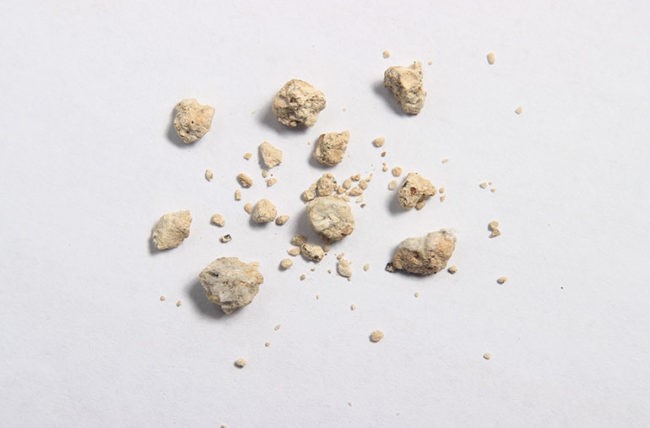Make these lifestyle changes to help prevent kidney stones
If you have kidney stones, you’ve more than likely left no stone unturned when it comes to finding ways to alleviate your pain.
That pain, and other symptoms, comes from the blockage a kidney stone can cause. And it’s typically when the stone is traveling through your ureter, the tube that drains your kidney into your bladder. When the stone causes a blockage, your urine backs up into your kidney and causes swelling and pain.
Whether it’s the size of a grain of sand or a quarter, your kidney stone can be painful.
So, can you get rid of kidney stones at home?
While there are home remedies that may help prevent stones, there isn’t a magic potion or at-home treatment that can dissolve the most commonly seen stones.
Certified nurse practitioner Tiffany Loboda, CNP of Cleveland Clinic, talks about ways to prevent kidney stones, how to manage a stone at home and when you need to see your doctor.
How to tell if you have kidney stones
Kidney stones are solid, often jagged, or even smooth-shaped, masses or crystals made of minerals and salts that form in your urinary tract.
Kidney stones can be caused by several factors like dehydration, diet, medical conditions, medications or genetics. There are different types of stones, too, like calcium oxalate, calcium phosphate, uric acid and struvite. Calcium oxalate is the most common kind, making up about 70% of stones.
“Those types of stones, along with others less common are not dissolvable,” says Loboda.
The most common symptom of kidney stones is pain in your back, abdomen or your side. Other symptoms include:
- Nausea.
- Vomiting.
- Blood in your urine.
- Pain with urination.
- Unable to urinate.
- The need to urinate more often.
- Urine that smells bad or looks cloudy.
- Fevers or chills.
“These symptoms typically occur when the stone moves out of the kidney,” says Loboda. “Stones that are within the kidneys generally don’t cause pain. The pain occurs when they begin to migrate out of the kidney and cause blockage.”
So, if you can’t dissolve your kidney stones, what can you do?
Work on prevention, advises Loboda. A few lifestyle changes can help decrease the risk of forming more stones in the future.
Drink fluids
The No. 1 reason kidney stones form is that you aren’t drinking enough fluids.
“Dehydration is a big factor,” says Loboda. “Staying well-hydrated is one of the most important factors for prevention. We always want people to drink plenty of fluids, unless there is a medical reason they are restricted from doing so.”
You should focus on having about 2.5 to 3 liters of urine output a day for adequate stone prevention, which translates to drinking about 80 to 100 ounces a day for the average person.
The internet is full of information on other fluids that can help with kidney stones, but for the most part, sticking with water is ideal.
But a few ingredients show promise, though the research is limited:
“Water is obviously the best thing, but all fluids count,” notes Loboda.
Consume citrus
Fruits and vegetables like lemon, limes, tomatoes, melons and oranges are great for keeping your levels of citrate high.
“Citrus is important because it binds calcium in the urine,” says Loboda. “Citrus can also dissolve some crystals before they have a chance to even turn into a stone.”
Whether you put a squeeze of lemon in your water or chop up tomatoes for your salad, it’s a good idea to incorporate these foods into your diet. You can even use a concentrated version of citrus juice. Loboda recommends about 4 ounces of concentrated juice to about 32 ounces of water.
“Think of citrus as a shield,” says Loboda. “So the more citrus you consume, the stronger your shield is going to be to protect you from stones.”
You can also get citrate in other ways like drinking Crystal Light® and clear-colored soda like Sprite® or Squirt®.
“Those drinks have a good amount of citrate. Clear sodas don’t carry the high risk for stones like darker colored sodas,” says Loboda. “The syrup in the dark sodas like Pepsi® and Coke® contain a lot of phosphoric acid, which can acidify the urine. Soda, regardless of type, can contain a lot of sugar, so it’s best to only use these in moderation.”
Those with conditions like Crohn’s disease or those who’ve had bariatric surgery may have trouble absorbing citrate from diet alone. In these cases, your doctor may prescribe a medication to boost citrate levels.
Don’t be afraid of calcium
Since the most common stone is calcium oxalate, many people think that avoiding or limiting their calcium intake helps prevent kidney stones
“Calcium is not the enemy for stones,” assures Loboda. “Calcium binds oxalates in the gut. If you restrict dietary calcium, then the oxalates you’re consuming aren’t going to leave through the digestive tract via stool. They’re going to get absorbed and then come out in your urine, which is not what we want.”
to get absorbed and then come out in your urine, which is not what we want.”
You should aim for about 1,000 to 1,200 milligrams of calcium per day. The goal isn’t to overconsume calcium, just get the recommended amounts.
Foods that contain a high amount of oxalates include spinach, beets, rhubarb and nuts. Black tea should only be consumed in moderation.
Watch your sodium intake
Following a low-sodium diet, about 2,000 to 2,300 milligrams a day, can help prevent kidney stones. Having too much sodium in your diet can trigger kidney stones by increasing the amount of calcium in your urine.
Watch the types of food you eat. Pizza, pastas, breads, bacon, sausage — foods that are processed, preserved, cured, canned or pickled have high amounts of sodium.
“We really get the vast majority of our daily sodium from just what’s contained within the foods that we’re eating,” says Loboda. “And unfortunately, a lot of things contain a lot of sodium.”
One way to cut down on the amount of salt in your diet is to start reading labels and thinking about serving sizes.
“Pay attention to serving size on the labels, that’s something that can trip you up,” says Loboda. “If you don’t read the serving size, then you might look at the label and see 100 milligrams of sodium but maybe there’s three or four servings in that package. It’s important to pay attention to both.”
When to see your doctor for your kidney stones
If you think you have a kidney stone, it’s important to see your doctor. If you’re in immense pain, have uncontrollable nausea or vomiting, a fever above 101 degrees Fahrenheit (38.33 Celsius), difficulties urinating or are passing thick bright red or clot-filled urine, head to the emergency room.
For nonurgent stone matters, talking to your doctor or a surgeon who specializes in treating and preventing stones like a urologist or nephrologist can help get you on the path to treatment and prevention.
The discussion on prevention often begins with conducting a 24-hour urine analysis.
“A 24-hour urine analysis gives us specifics about your risk factors,” explains Loboda. “We can determine what could be in the diet that can be increasing the risk for stones or causing them to form. It really enables us to come up with an individualized plan for prevention.”
It’s important to note that most people who have a kidney stone have a high chance of developing them again.
“If you don’t start focusing on prevention early on, stones can grow and turn from a very small problem into a potentially large problem,” cautions Loboda.


 Crime5 days ago
Crime5 days ago
 Caribbean News1 week ago
Caribbean News1 week ago
 News1 week ago
News1 week ago
 News6 days ago
News6 days ago
 News5 days ago
News5 days ago
 Caribbean News6 days ago
Caribbean News6 days ago
 Bahamas News5 days ago
Bahamas News5 days ago
 Crime5 days ago
Crime5 days ago













